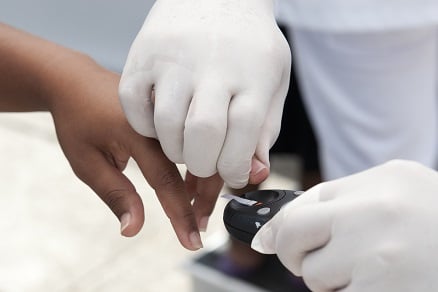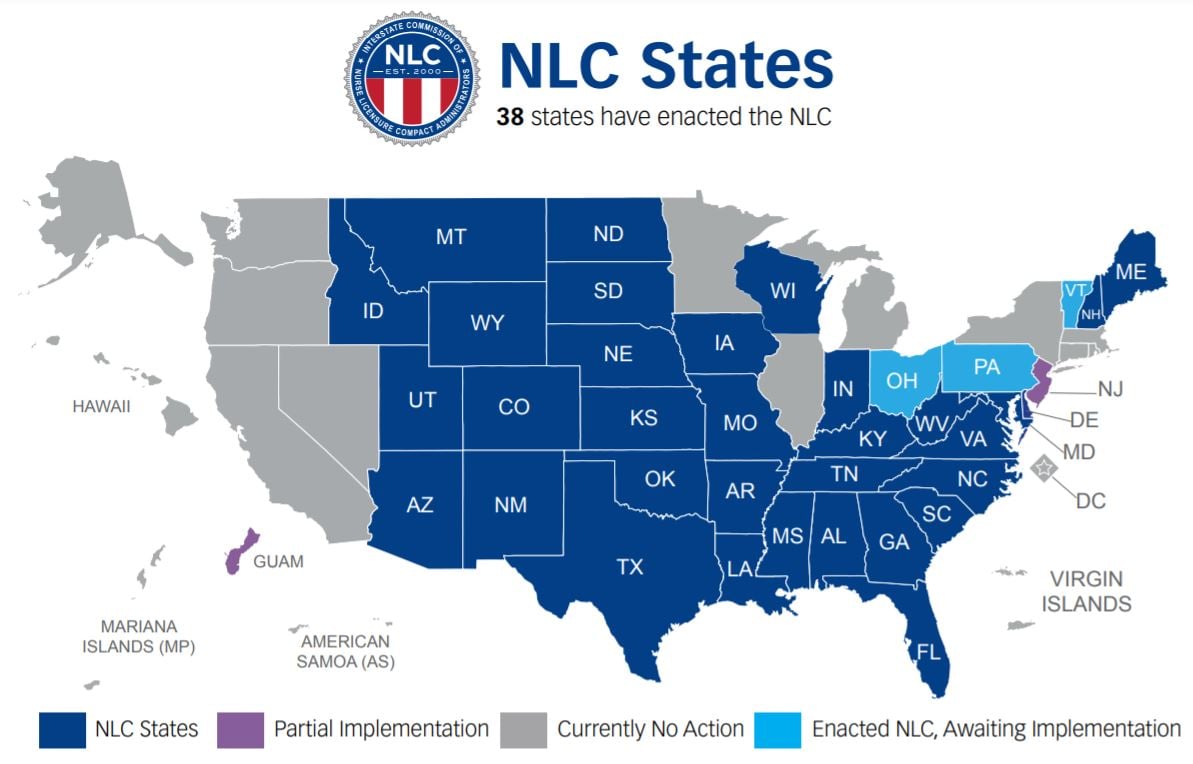
LPN/LVN Reciprocity – How to Practice in Another State

Moving to a new state can be a lot of work, both physically and mentally. You may not think to ensure that your nursing license will transfer properly or that you have all the correct documentation before leaving your state.
However, one of the very first things that you should consider is how your license is going to be affected if you are planning on moving out of state. It’s a lot easier than you might imagine, but can take a few months to get everything finalized.
Obtaining an LPN or LVN License In a New State
The first step in obtaining your LPN license in a new state is applying. Every state has their individual website which describes their process of becoming an actively licensed nurse. You can find your state by visiting the National Council of State Board of Nursing. Once you enter the website for your new state’s Board of Nursing, you will want to get familiar with their process of transferring licenses.
Reciprocity and Endorsement
Some states will allow you to move to their state and work as an LPN without obtaining a new license at all. This is called reciprocity. Other states will require endorsement, which is when you work actively as an LPN while your new state of residence reviews specific criteria in order to issue you a license for their state. Again, it’s a good idea to familiarize yourself with your new state’s process by visiting their Board of Nursing’s website.
In any case, you must have completed an accredited LPN program and passed the NCLEX exam in your previous state in order to take advantage of reciprocity or apply for endorsement.
Nurse Licensure Compact (NLC)
The original Nurse Licensure Compact (NLC) was an agreement that states could opt-in to which allowed multi-state nursing licenses, essentially letting nurses provide care in other NLC states in person or via telehealth. As of January 2018, a new Enhanced Nurse Licensure Compact (eNLC) has gone into effect, replacing the original NLC. Under the enhanced NLC, nurses will still be able to provide care to patients in other NLC states without having to obtain a new license, and those under the original NLC will be grandfathered into the new enhanced NLC. The additions to the new NLC include rules about requiring a criminal background check, a restriction on acquiring a license if the applicant has ever been convicted of a felony, and the adoption of 11 uniform requirements for all NLC states.
Uniform Licensure Requirements for Multi-State Licenses
There are 11 uniform requirements that nurses must meet under the NLC structure in order to be eligible for a multi-state license in another state that’s a part of the NLC. These requirements include:
- Meets requirements for licensure in the applicant’s state of residency
- Has graduated from a board-approved education program, or an approved international education program
- Has passed an English proficiency exam (if education was completed internationally or if English is not the applicant’s native language)
- Has passed the NCLEX-PN exam
- Is eligible for or holds an active, unencumbered license
- Has submitted to state and federal criminal background checks
- Has no state or federal felony convictions
- Has no misdemeanor convictions related to the practice of nursing
- Is not currently a participant in an alternative program
- Is required to self-disclose current participation in an alternative program
- Has a valid United States Social Security number
Keep in mind that nurses who held a multi-state license as of July 20, 2017 will be grandfathered in to the new agreement and will not need to meet these requirements, unless they move to another state.
Which States Are In the NLC?
Currently, the majority of states have opted in to move forward with the NLC. There are also some states that have not yet joined the NLC, or are awaiting legislation to be able to join.
Below you will find a current map which clearly marks which states are, and which are not, taking part in the NLC. This map also includes the states pending legislature or implementation for the NLC.
Image Source: https://www.ncsbn.org/nurse-licensure-compact.htm
LPN/LVN License by Endorsement
How can practical nurses work in a new state if they come from a state that is not a part of the NLC? The answer is a process called license by endorsement. This essentially allows the nurse to obtain an additional single-state nursing license. LPNs applying for a license by endorsement must meet their new state's eligibility requirements, which often includes the following:
- Proof of LPN/LVN licensure in your home state
- Submission of official transcripts from a state-approved nursing program
- Proof of passing score on the NCLEX-PN exam
- Criminal background check
Specific requirements and other LPN licensure by endorsement information can be found through each state's Board of Nursing.
LPN/LVN Licensing Requirements by State
- Alabama
- Alaska
- Arizona
- Arkansas
- California
- Colorado
- Connecticut
- Delaware
- Florida
- Georgia
- Hawaii
- Idaho
- Illinois
- Indiana
- Iowa
- Kansas
- Kentucky
- Louisiana
- Maine
- Maryland
- Massachusetts
- Michigan
- Minnesota
- Mississippi
- Missouri
- Montana
- Nebraska
- Nevada
- New Hampshire
- New Jersey
- New Mexico
- New York
- North Carolina
- North Dakota
- Ohio
- Oklahoma
- Oregon
- Pennsylvania
- Rhode Island
- South Carolina
- South Dakota
- Tennessee
- Texas
- Utah
- Vermont
- Virginia
- Washington
- Washington, DC
- West Virginia
- Wisconsin
- Wyoming
-
LPN to RN/BSN Online - Achieve Test Prep

*Must Be a LPN/LVN
LPNs earn your ADN or BSN degree online in up to 1/2 the time and cost of traditional programs. With No Waiting List to get started, Free Books, and Low Cost financing options available, this is the perfect way for LPNs, LVNs, and Paramedics to earn your Associates Degree in Nursing and your RN license. Our convenient, instructor led test-out program allows you to learn at an accelerated pace and earn college credit-by-examination which then is eligible to be transferred to an ACEN accredited nursing school or 100's of universities nationwide.
Another step you will need to take is to visit the Nursys website to see if the state that you are relocating to participates with their system. Nursys is a database that is used to verify nursing credentials. If your state participates in it, then you will register and pay a $30 fee per jurisdiction to have your license verified through them. It’s really convenient because it eliminates additional paperwork. However, fees can add up quickly because you will be paying fees to your current state and future state of residence.
You may be required to take their practical nursing exam in order to receive your license. Because of this, you will want to start working towards the process of transferring your license as soon as possible to reduce any delays. Read more about working as an LPN.
Related Articles
Featured Article

Diabetes Nurse Educator Careers with BSN





